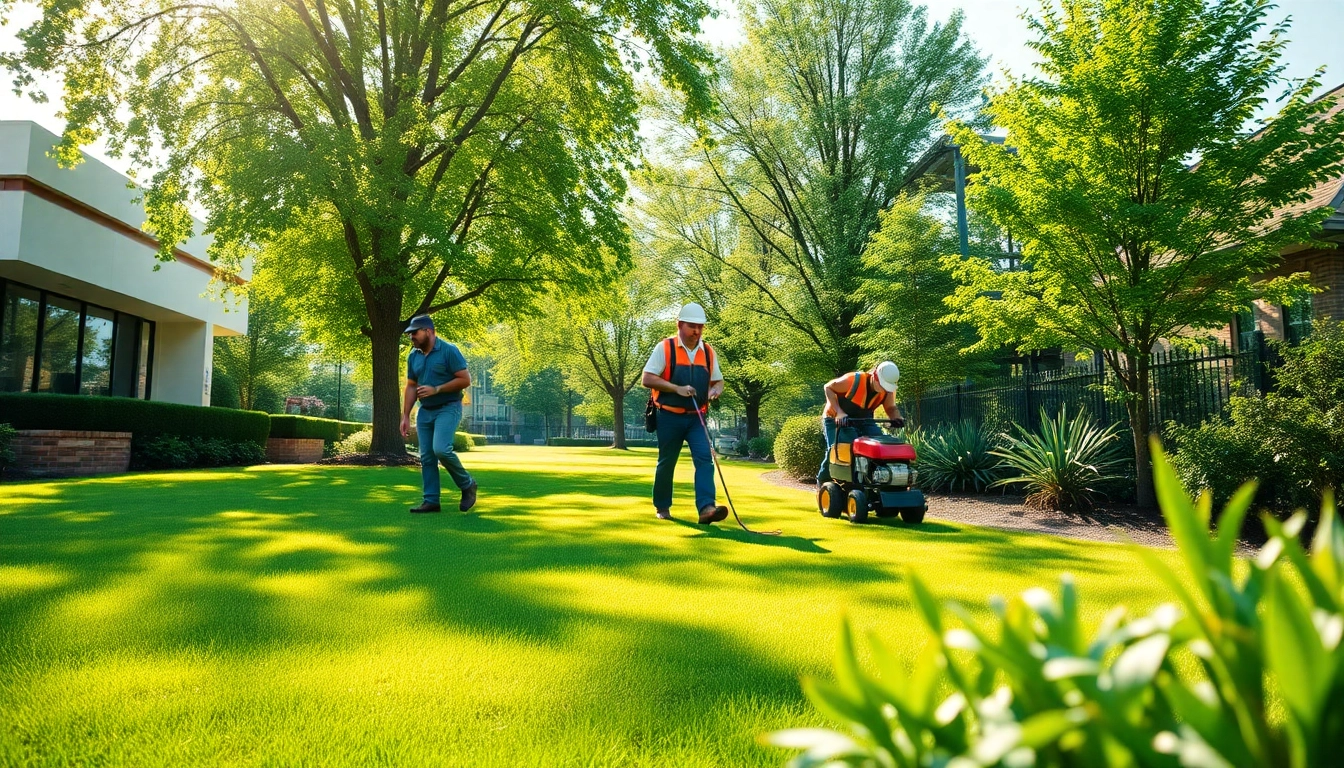Understanding the Role of Commercial Landscaping Contractors
Commercial landscaping contractors play a pivotal role in enhancing the aesthetics and functionality of business properties and public spaces. They offer a range of services geared towards sustainable landscape management, design, and maintenance. Regardless of whether you manage a corporate office, a retail environment, or a community park, understanding the expertise that commercial landscaping contractors provide can help you establish an appealing and functional outdoor space.
What They Do: Services Offered by Contractors
The services provided by commercial landscaping contractors vary widely, but they typically fall under certain categories:
- Landscape Design and Installation: This includes planning and creating green spaces that reflect the brand image while considering functionality and environmental impact.
- Lawn Care: Regular mowing, fertilizing, weed control, and aeration are essential to maintaining a healthy and attractive lawn.
- Tree and Shrub Care: Pruning, planting, and maintaining trees and shrubs can enhance property aesthetics and prevent overgrowth that could cause damage.
- Irrigation Systems: Installing and maintaining irrigation systems is key to conserving water and ensuring that plants receive proper hydration.
- Seasonal Clean-ups: Many contractors provide end-of-season and spring clean-up services to prepare landscapes for changing weather conditions.
- Hardscaping: This involves installing pathways, patios, and retaining walls, which contribute both functionality and visual appeal to outdoor spaces.
- Maintenance Programs: Ongoing maintenance programs help ensure landscapes remain in pristine condition, covering everything from weed control to pest management.
Why You Should Hire Commercial Landscaping Contractors
Engaging experts in the field of commercial landscaping offers numerous advantages. Here are a few compelling reasons to consider:
- Expertise: Commercial landscaping contractors have extensive knowledge and experience, which is invaluable for ensuring that landscapes are both functional and sustainable.
- Time and Cost Efficiency: Hiring professionals can save you time and money in the long run, as they can quickly identify potential issues and implement solutions effectively.
- Increased Property Value: A professionally landscaped property can significantly boost your business’s curb appeal and overall market value.
- Creative Design Solutions: Contractors can conceptualize designs that focus on the specific needs of your business, making your outdoor area not just a space, but an extension of your brand.
How to Evaluate Your Landscaping Needs
Identifying your landscaping needs is a critical first step when considering hiring a contractor. Here are several considerations to help you evaluate your requirements:
- Space Analysis: Assess your outdoor space’s size, shape, and current condition. Understanding each area’s strengths and weaknesses can help define your landscaping goals.
- Purpose Identification: Determine what you want from your landscaping—whether it be aesthetic enhancement, outdoor recreational space, or environmentally sustainable solutions.
- Budget Allocation: Establish a budget that encompasses all potential landscaping activities, including installation, maintenance, and unexpected repairs.
- Long-Term Vision: Think about the future of your landscape. Consider how plants will grow, maintenance requirements, and how your landscaping can adapt over time.
Key Qualities to Look for in a Contractor
Finding the right commercial landscaping contractor is critical to the success of your project. Here are some essential qualities to look for:
Experience and Expertise in Commercial Landscaping
The landscape industry can be complex and multifaceted. As such, hiring a contractor with proven experience can provide great reassurance. Look for contractors with:
- Industry Experience: A long history in commercial landscaping often equates to a deeper understanding of industry norms and challenges.
- Specialization: Determine if they specialize in the type of project you are looking for, whether that be corporate, civic, or residential landscaping.
Client Testimonials and Portfolio Review
Reviewing a contractor’s past work and client feedback can help you gauge their quality and reliability. Consider:
- Portfolio: Look through portfolios for projects that align with your vision. Note creativity, attention to detail, and variety in designs.
- Testimonials: Check for reviews or reach out to past clients to understand their experiences regarding communication, timeliness, and workmanship.
Certifications and Industry Standards
Certifications indicate a contractor’s commitment to upholding industry standards. Here are some qualifications to consider:
- Professional Associations: Membership in relevant associations such as the American Society of Landscape Architects (ASLA) can signify credibility.
- Certifications: Look for certifications that demonstrate a commitment to best practices, such as the Certified Landscape Professional (CLP) designation.
Cost Factors Involved in Commercial Landscaping
Understanding the various cost factors in commercial landscaping is essential for effective budgeting and planning. Here are key elements to consider:
Understanding Pricing Models for Contractors
Contractors may use different pricing models based on the scope and nature of services provided. Key models include:
- Hourly Rates: Charges based on the number of hours worked, commonly used for smaller or maintenance tasks.
- Flat Fees: A single price for a specific job, suited for well-defined projects.
- Cost-plus Contracts: These include direct costs plus a percentage for profit, allowing flexibility in larger projects.
Budgeting for Efficient Landscaping Solutions
When creating a budget for your landscaping project, several practical steps can ensure a smooth financial process:
- Ask for Detailed Estimates: Request comprehensive quotes from multiple contractors to compare offerings and scope of work.
- Plan for Additional Costs: Include a buffer in your budget for unexpected expenses, such as seasonal changes or additional maintenance.
Evaluating Value versus Cost
It’s crucial to assess the value you receive versus the cost incurred. Here are some considerations:
- Quality of Work: Cheaper services might lead to poor outcomes. Evaluate quality over cost when making your decision.
- Long-term Benefits: Investing in higher quality and sustainable landscaping can reduce long-term maintenance and replacement costs.
Best Practices for Working with Landscaping Contractors
Collaborating effectively with commercial landscaping contractors can pave the way for a successful project. Here are some best practices:
Setting Clear Expectations and Communication
Establishing clear communication from the outset can help ensure alignment throughout the project. Key points include:
- Define Objectives: Clearly outline your landscaping goals and vision to the contractor.
- Regular Updates: Schedule regular check-ins to discuss progress, changes, and any potential issues.
Scheduling and Project Management Techniques
A well-organized project schedule enhances efficiency. Consider the following techniques:
- Timelines: Create a project timeline that outlines when tasks will begin and their expected completion dates.
- Use Project Management Tools: Consider utilizing software or tools that enhance collaboration and tracking of progress in real-time.
Post-Project Maintenance and Support
The completion of a landscaping project is just the beginning. Ensure you have a maintenance plan in place:
- Follow-Up Services: Discuss with the contractor about maintenance options available post-installation.
- Regular Assessments: Schedule periodic reviews of the landscape to address any issues that may arise over time.
Measuring the Success of Your Landscaping Project
Assessing the outcomes of your landscaping initiatives is vital for future planning. Here are methods for measurement:
Key Performance Indicators to Monitor
Identify the right KPIs to evaluate the effectiveness of your landscaping project:
- Aesthetic Appeal: Monitor how well the landscape complements your property visually.
- Visitor Engagement: Measure an increase in foot traffic and engagement in outdoor spaces.
Benefits of Regular Landscape Maintenance
Regular maintenance ensures that your landscaping continues to thrive. Key benefits include:
- Health of Plants: Consistent care contributes to better plant health and longevity.
- Aesthetics: Ongoing maintenance preserves the look and feel of the landscape, maintaining curb appeal.
Long-term Value and Curb Appeal Considerations
Finally, understanding the long-term value and curb appeal of a successful landscaping project can justify the investment:
- Property Value: Quality landscaping can increase property value by creating an inviting environment that appeals to tenants, clients, or customers.
- Sustainability Impact: Well-planned landscapes that consider local ecology can contribute positively to the environment and reduce long-term costs.



